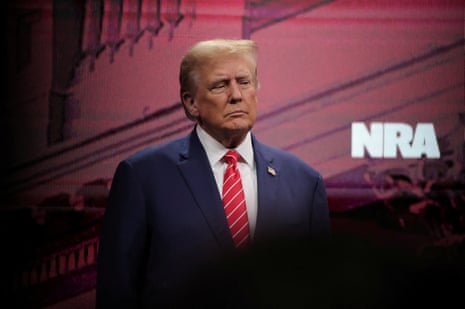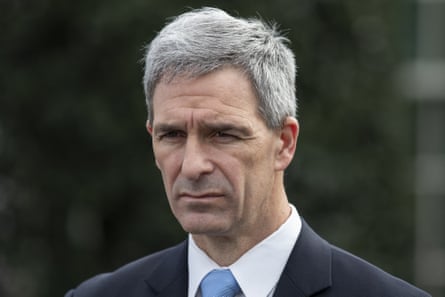Trump has railed against urban centers run by Democrats, and Project 2025 lays out how to crack down on them

To hear Donald Trump tell it, America’s cities are in dire shape and in need of a federal intervention.
“We’re going to rebuild our cities into beacons of hope, safety and beauty – better than they have ever been before,” he said during a recent speech to the National Rifle Association in what has become a common refrain on the campaign trail. “We will take over the horribly run capital of our nation, Washington DC.”
Trump has for years railed against cities, particularly those run by Democratic officials, as hotbeds for crime and moral decay. He called Atlanta a “record setting Murder and Violent Crime War Zone” last year, a similar claim he makes frequently about various cities.
His allies have an idea of how to capitalize on that agenda and make cities in Trump’s image, detailed in the conservative Project 2025: unleash new police forces on cities like Washington DC, withhold federal disaster and emergency grants unless they follow immigration policies like detaining undocumented immigrants and share sensitive data with the federal government for immigration enforcement purposes.
Project 2025’s Mandate for Leadership: The Conservative Promise, an extensive document breaking down each part of the federal government and recommending changes to be made to advance rightwing policy, was created by the Heritage Foundation, with dozens of conservative organizations and prominent names contributing chapters based on their backgrounds.
This part of the project is another Republican attempt at a crackdown on so-called “sanctuary” cities, places around the country that don’t cooperate with the federal government on enforcing harsh immigration policies.
Trump v Washington DC
Washington DC, in particular, has taken up residence in Trump’s stump speech, where he rails against the city for crime, graffiti and general mismanagement. He vows that the federal government will take over the city and run it.
Project 2025 posits a way to do this: use the Secret Service. The service’s police force, the Uniformed Division, doesn’t have the ability to enforce laws outside the White House and its immediate surrounding area, the project says. But that could change.
“As the District of Columbia is a federal jurisdiction and currently is beholden to the trend of progressive pro-crime policies, UD officers should enforce all applicable laws,” Project 2025 says. “The result would be to allow UD officers to gain more law enforcement experience – an attractive credential that would improve morale.”
Trump’s allies in Congress have already been taking aim at DC, with Arizona’s Republican US representative Andy Biggs saying he’d support a federal takeover of the city to enforce laws and the Florida representative Byron Donalds pushing a bill to put Congress in charge of some DC criminal laws. The US House also will reverse a DC policy that allows non-citizens to vote in local elections, a pet issue nationwide for Republicans this election year.

The anti-DC sentiment is predicated on crime rates, which, after reaching a peak in 2023, is down this year compared with last year, DC police data shows.
In a speech to the National Rifle Association earlier this month, Trump went on about what he’s seen in DC lately that justifies a federal takeover.
“I was there recently on a court case, of course. I get so many court cases,” he said. “And I’m driving into a federal courthouse, and the graffiti all over the place is unbelievable. It’s staggering. The roads are full of potholes. The medians in the middle, you know, the guardrails, are all broken and some of them laying, literally laying, in the street. The garbage is piled up and disgusting, cans are laying there for many months.”
So it’s time for a change, he says: “We’re going to make our capital strong again. We’re going to run our capital, we’re going to take our capital over by the federal government, it’s going to run properly, not the way it’s run right now.”
The office of DC Mayor Muriel Bowser declined to comment.

Trump has posited creating new cities whole cloth as well, predicated on the idea that cities now are uninspiring at best.
Last year, he talked about building “freedom cities” on federal lands, though this idea hasn’t entered into his speeches lately, which have taken a darker turn. At the time, he said there should be a contest to charter 10 new cities using vacant, federally owned land. And he challenged local leaders to work with him to get rid of “ugly buildings”, make cities and towns more liveable and build new monuments to “our true American heroes”.
“These freedom cities will reopen the frontier, reignite American imagination and give hundreds of thousands of young people and other people, all hardworking families, a new shot at home ownership and, in fact, the American Dream,” he said in one video.
The threat of withholding federal funds
Republicans, cheered on by Trump, have worked to make immigration a key issue in cities across the country by busing migrants from the US-Mexico border inland, to places run by Democrats like New York, DC and Chicago, overwhelming the social safety net in these cities.
The idea of using federal funds granted by the Federal Emergency Management Agency (Fema) to force immigration changes are included in a chapter about the Department of Homeland Security, written by Ken Cuccinelli, Trump’s former deputy secretary of homeland security.
The chapter’s initial recommendation is to dismantle DHS entirely, create a border-focused agency comprised of other immigration-related organizations and farm out the rest of its components to existing agencies (or privatize them, in the case of the Transportation Security Administration).
It’s not directly clear whether the aim is to use all Fema funds – including those that help cities and states in the immediate aftermath of an emergency like a tornado or flood – or large grant programs for things like emergency preparedness. One line in the chapter says “post-disaster or nonhumanitarian funding” could be exempt from the immigration policy requirements. The chapter also suggests that cities and states should take on more of the burden of financially responding to disasters.
Project 2025 did not respond to a request for an interview or comment.

Fema administers most of the homeland security department’s grant programs to local governments, the project notes. The chapter suggests the many billions of dollars in Fema grants outside of post-disaster relief have become an avenue for special interests and “pork” spending that “do not provide measurable gains for preparedness or resiliency”.
The concept of withholding federal funding in this way is not new for Trump. During his time in office, Trump tried to use the federal government’s funding strings to deprive US cities that didn’t abide by immigration policies of a justice department grant program, though the process got tied up in the courts for years.
The Biden administration reversed the policy of using the Edward Byrne memorial justice assistance grants program, which sends about $250m annually to local law enforcement, to compel immigration compliance.
Trump also threatened in 2020 to withhold federal funds from cities he claimed had “allow[ed] themselves to deteriorate into lawless zones” after that summer’s protests over the killing of George Floyd by a Minneapolis police officer. In a memo, he specifically mentioned Portland, Seattle and New York City as places where chaos reigned, directing the federal government to review the use of federal funds to places that “permit anarchy, violence and destruction in America’s cities”.
One of the conditions Project 2025 suggests is requiring states or localities to share information with the federal government for law and immigration enforcement, and specifies that this would include both department of motor vehicle and voter registration databases.
This is of particular interest in many cities because 19 states and Washington DC allow undocumented people to get drivers licenses, the Niskanen Center, a thinktank that delved into the project’s immigration aims, points out. These licenses help with public safety by decreasing the potential for hit-and-runs and increasing work hours, among other benefits, the center writes.
If a city or state is forced to choose between issuing licenses and then sharing this information for use by immigration authorities, or accessing emergency funds for their whole population in a crisis, it’ll be tough for them to deny Fema money, said Cecilia Esterline, an immigration research analyst at the Niskanen Center.
“I think that it is most likely that maybe the state will bend to the will of the executive on this. But that comes at a cost, and that cost is not just a political one,” she said, though she noted that there will be pushback and likely lawsuits from states and cities if an incoming Trump administration tries to put these policies in place.
